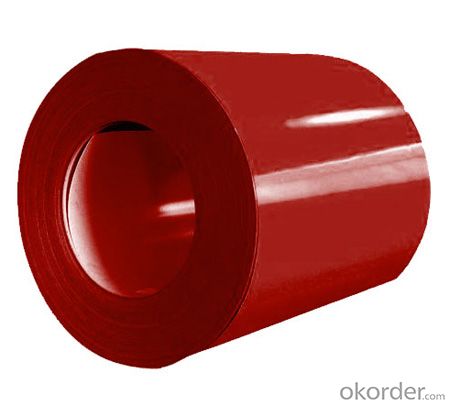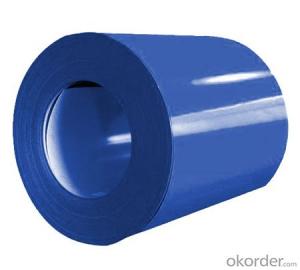Prepainted Galvanized Steel Coil Good Quality-CGCC
- Loading Port:
- China main port
- Payment Terms:
- TT OR LC
- Min Order Qty:
- 50 m.t.
- Supply Capability:
- 15000 m.t./month
OKorder Service Pledge
OKorder Financial Service
You Might Also Like
Prepainted Galvanized Steel Coil Good Quality-CGCC
1. Structure of Prepainted Galvanized steel Coil :
•Prepainted galvanized steel qualified with excellent decorative ,formability ,corrosion resistance ,coating adhesion ,can keep for a long time as well as maintain fresh color .For color coated steel sheet can obtain good economic benefit by steel belt wood ,efficient in construction and save energy ,prevent pollution etc. Which is an ideal material for manufacturing board.
2.Main Features of Prepainted Galvanized steel Coil:
• Excellent process capability
• Smooth and flat surface
• Workability, durability
• Excellent heat resistance performance
• High strength
• Good formability
• Good visual effect
3.Prepainted Galvanized steel Coil Images

4.Prepainted Galvanized steel Coil Specification
Standard: ASTM, GB,JIS,JIS G3302 ASTM 755 EN10169
Grade: DX51D CGCC CS
Thickness: 0.18mm~1.2mm,
Width: 600-1250mm
Coil weight:3-12 MT
Coil ID:508/610mm
Chemical composition:
C | Si | Mn | Cr | Ni | P | S |
0.150 | 0.476 | 11.231 | 12.50 | 0.900 | 0.039 | 0.010
|
5.FAQ of Prepainted Galvanized steel Coi
We have organized several common questions for our clients,may help you sincerely:
1.How do you control your quality
We have established the international advanced quality management system,every link from raw material to final product we have strict quality test;We resolutely put an end to unqualified products flowing into the market. At the same time, we will provide necessary follow-up service assurance.
2.How long we will receive the goods ?
After receiving your deposit or workable lc ,our normal shipment date is 15-20days,and it takes around 28 days to reach your port of destination. But is up to different destination
3. What is your moq
Normally our moq is 25per size ,but it is up to different size
- Q:How are steel coils processed for edge trimming or shearing?
- Steel coils are processed for edge trimming or shearing by first uncoiling the coil and feeding it into a machine equipped with either rotary shears or slitting knives. These tools trim or shear the edges of the coil to remove any irregularities, ensuring a precise and uniform width. The trimmed edges are then inspected for quality and smoothness before the coil is recoiled for further processing or storage.
- Q:How do steel coils compare to other materials like aluminum or copper?
- Steel coils have several advantages and disadvantages when compared to other materials like aluminum or copper. One major advantage of steel coils is their strength and durability. Steel is known for its high tensile strength, which means it can withstand heavy loads and high stress without deformation. This makes steel coils ideal for applications that require strong and sturdy materials, such as construction, automotive manufacturing, and transportation industries. In comparison, aluminum and copper are generally softer and less strong than steel, making them less suitable for heavy-duty applications. Another advantage of steel coils is their cost-effectiveness. Steel is a relatively inexpensive material compared to aluminum or copper, making it a more affordable option for large-scale projects or mass production. Additionally, steel is highly recyclable, contributing to its cost-effectiveness and sustainability. However, steel coils also have some drawbacks compared to aluminum or copper. One notable disadvantage is their weight. Steel is significantly denser than aluminum or copper, which can make steel coils heavier and more challenging to handle and transport. This can be a drawback in industries where weight is a critical factor, such as aerospace or electrical applications. Another disadvantage of steel coils is their susceptibility to corrosion. While aluminum and copper are naturally corrosion-resistant, steel is prone to rust and oxidation. Therefore, steel coils need to be properly protected and coated to prevent corrosion, which adds to the overall cost and maintenance requirements. In summary, steel coils offer superior strength, durability, and cost-effectiveness compared to aluminum or copper. However, they are generally heavier and more prone to corrosion. Ultimately, the choice between steel, aluminum, or copper will depend on the specific application, budget, and requirements of the project.
- Q:Can steel coils be coated with light-reflective materials?
- Yes, steel coils can be coated with light-reflective materials.
- Q:What are the different types of surface treatments for steel coils?
- Steel coils can undergo various surface treatments to enhance their appearance, protect against corrosion, and improve durability. Common treatments include: 1. Hot-dip galvanizing: Immersing steel coils in molten zinc creates a protective layer, offering exceptional corrosion resistance and resilience in harsh environments. 2. Electro-galvanizing: Electroplating a thin zinc layer onto the steel surface provides good corrosion resistance and enhances aesthetics. 3. Organic coating: Coating steel coils with organic materials like paints, lacquers, or polymer films offers corrosion, abrasion, and UV protection, while providing a wide range of color options. 4. Phosphating: Treating the steel surface with a chemical process forms a layer of phosphate crystals, improving coating adhesion and corrosion resistance. 5. Chromating: Also called passivation, this treatment involves applying a chromate conversion coating, enhancing corrosion resistance and offering a decorative finish. 6. Oiling: Applying a thin layer of oil to steel coils during storage and transportation prevents corrosion and can be easily removed before further processing. 7. Pickling: Immersing steel coils in an acid solution removes impurities and scale, improving surface finish and preparing the steel for subsequent processing or coatings. 8. Tin plating: Electroplating a layer of tin onto steel coils provides excellent corrosion resistance, solderability, and aesthetic appeal. These treatments are just a few examples of the many available for steel coils. The choice depends on specific application requirements, including desired appearance, corrosion resistance, and environmental conditions.
- Q:How are steel coils used in the production of aerospace components?
- Steel coils find multiple applications in the production of aerospace components. One primary use involves their use in the manufacturing of structural parts like frames, beams, and brackets. To achieve this, steel coils are often transformed into flat sheets or strips, which are subsequently cut and shaped into the desired form for these components. Given the strong and durable nature of steel, it is an ideal material for these critical parts that must withstand extreme forces and conditions. Moreover, steel coils are also indispensable in the production of engine components, including turbine blades and combustion chambers. These components demand materials with exceptional mechanical properties and high resistance to elevated temperatures. Consequently, steel coils undergo processing and shaping to create intricate forms, ensuring the efficient and reliable functioning of these vital engine parts. Furthermore, steel coils play a crucial role in the production of fasteners, such as bolts, nuts, and screws, which are essential for assembling various aerospace components. The exceptional strength and corrosion resistance of steel make it the preferred choice for these fasteners, as they must endure the intense forces and harsh environments encountered during flight. In summary, the utilization of steel coils is of utmost importance in the production of aerospace components, as they provide the necessary strength, durability, and reliability required for safe and efficient operation in the demanding aerospace industry.
- Q:When I got my AR-15 I was told that I should get either get Brass or Steel Case ammo and stick with one or the other, I was wondering why? It surely wouldn't damage anything switching back and forth between the two would it? I got steel case ammo and I have stuck with It and probably will either way, I was just wanting to know it I ever wanted to get some Hornady's or somthing like that.
- When I first got my ar i used 500rds of wolf steel but since i heard its bad I only use brass but I did shot 30rds of steel then 30rd brass one time at the range and I have not had any problems with it. I have put 700rds though it 500 steel.
- Q:How do steel coils resist corrosion?
- Steel coils resist corrosion through a combination of factors including the presence of protective coatings, the use of corrosion-resistant alloys, and proper handling and storage practices. The most common method to prevent corrosion in steel coils is the application of protective coatings such as zinc, known as galvanization. This process forms a barrier between the steel and its environment, preventing exposure to moisture and corrosive elements. The zinc coating acts as a sacrificial layer, corroding in place of the steel. Another method to enhance corrosion resistance is the use of corrosion-resistant alloys, which are specifically designed to withstand harsh environments. These alloys contain elements such as chromium, nickel, or molybdenum, which form a passive oxide layer on the surface of the steel, protecting it from corrosion. Proper handling and storage practices also play a crucial role in preventing corrosion. Steel coils should be stored in a dry and well-ventilated area to minimize exposure to moisture. They should be protected from contact with other metals and materials that may cause galvanic corrosion. Regular inspection and maintenance are also important to identify and address any signs of corrosion early on. In summary, steel coils resist corrosion by utilizing protective coatings, corrosion-resistant alloys, and proper handling and storage practices. These measures work together to prolong the lifespan of steel coils and ensure their durability in various environments.
- Q:We all know that when we drop a small steel ball (size 3mm diameter; weight 1.10 grams) and a paper (size 11.7 inches length and 8.3 inches breadth; weight 4.5 grams) from a height. The steel ball will win the race to the ground due to its aerodynamic structure.Now imagine the same steel ball with the same weight converted to the structure similar that of paper. What will be the result? Which object will fall first; steel sheet or paper?
- The 2 objects will have the same size and shape. Therefore they will have the same air resistance. So the heavier object (the sheet of paper) will reach the ground first.
- Q:Steel steps steel guard rail steel chair. You see where I'm going with this.
- Lex Luger's right elbow... OH YESH!!!! I SEE WERE YOU ARE GOING WITH THIS!!!
- Q:How are steel coils used in the manufacturing of agricultural silos?
- Steel coils are used in the manufacturing of agricultural silos as they are rolled into large cylindrical shapes to form the outer structure of the silo. These coils provide strength, durability, and resistance to external elements, ensuring the silo can withstand the weight of the stored agricultural products and protect them from moisture and pests.
1. Manufacturer Overview |
|
|---|---|
| Location | |
| Year Established | |
| Annual Output Value | |
| Main Markets | |
| Company Certifications | |
2. Manufacturer Certificates |
|
|---|---|
| a) Certification Name | |
| Range | |
| Reference | |
| Validity Period | |
3. Manufacturer Capability |
|
|---|---|
| a)Trade Capacity | |
| Nearest Port | |
| Export Percentage | |
| No.of Employees in Trade Department | |
| Language Spoken: | |
| b)Factory Information | |
| Factory Size: | |
| No. of Production Lines | |
| Contract Manufacturing | |
| Product Price Range | |
Send your message to us
Prepainted Galvanized Steel Coil Good Quality-CGCC
- Loading Port:
- China main port
- Payment Terms:
- TT OR LC
- Min Order Qty:
- 50 m.t.
- Supply Capability:
- 15000 m.t./month
OKorder Service Pledge
OKorder Financial Service
Similar products
New products
Hot products
Related keywords





























